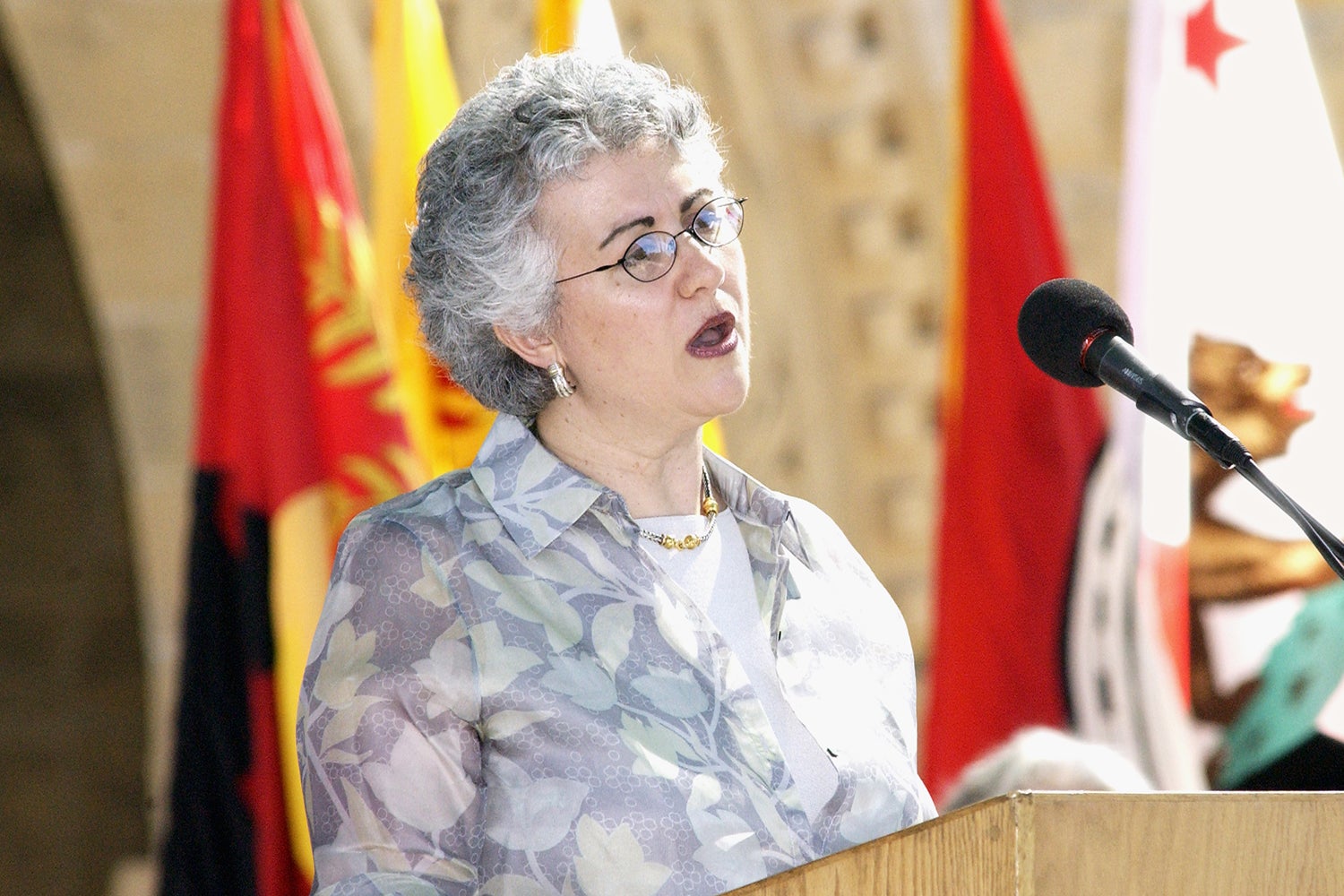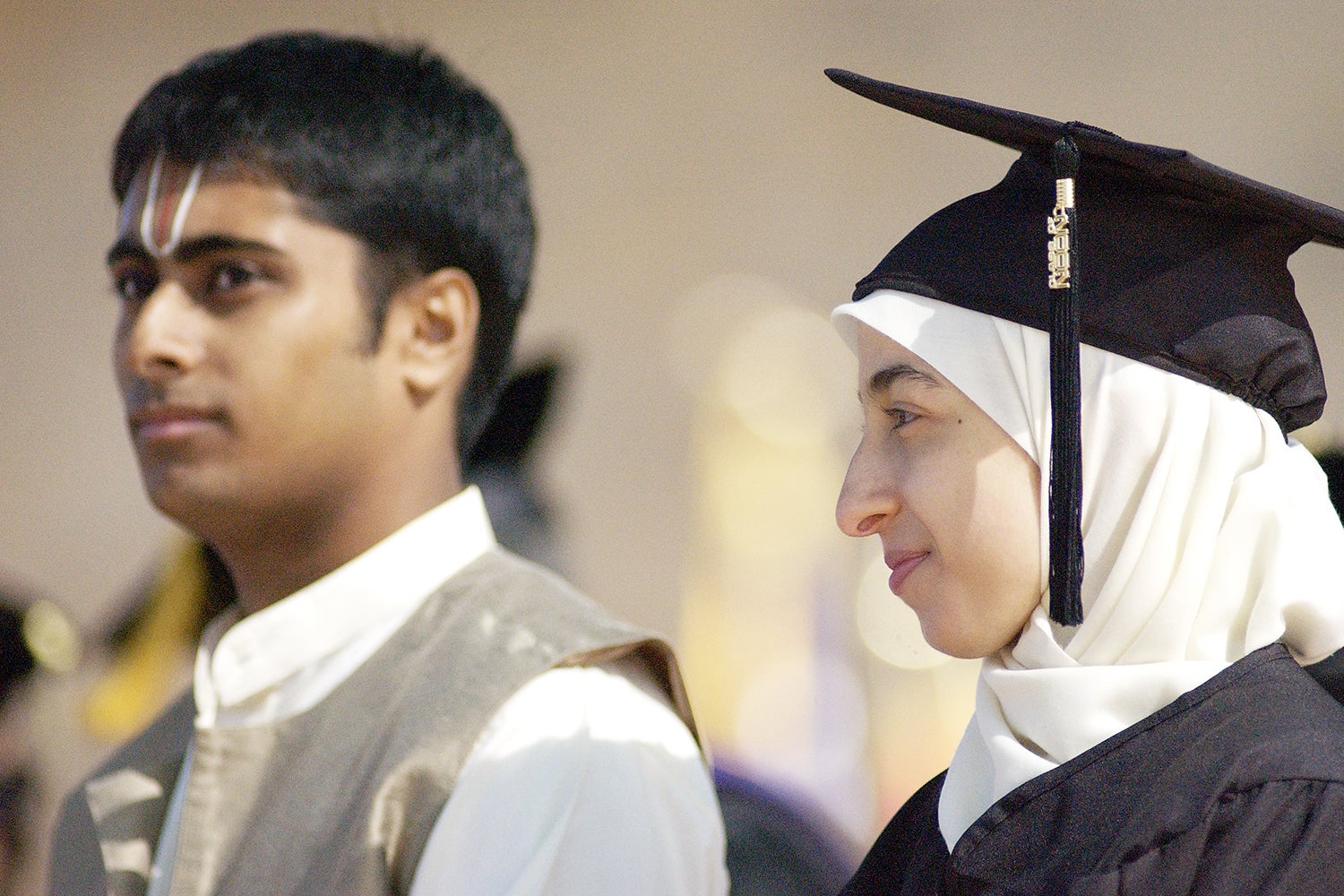Rabbi reminds graduates of their duties as they enter a world of ‘mud and muck’
The Baccalaureate address by Rabbi Ellen Jay Lewis considered how human beings are different from other creatures in the animal kingdom and what responsibility comes with this distinctiveness.
Featuring an Ojibwa prayer, a story from an old Taoist text and a Zulu call-to-meeting song, the multifaith Baccalaureate Celebration Saturday morning in the Inner Quad was a time for reflection on the spiritual dimensions of a university education. About 3,800 graduating seniors, family members and friends attended the event, whose main speaker was Rabbi Ellen Jay Lewis, the first woman rabbi to have a son graduate from Stanford.

The celebration included an address by Rabbi Ellen Jay Lewis. (Image credit: L.A. Cicero)
Lewis’ address considered how human beings are different from other creatures in the animal kingdom and what responsibility comes with this distinctiveness.
In a speech titled “Why Me?” Lewis discussed the uniquely human capacity for asking this question and for developing self-awareness. Alligators, she joked, do not ask, “I wonder whether I am as good an alligator as I can be?”
But knowing who we are and how we have come to be who we are show us the choices we make in our lives, she said. Yet, she added, “living as a human being is more than a matter of having and making choices; it’s being aware of having freedom of choice and then being able to utilize it.”
Lewis said that using freedom of choice properly means avoiding narcissism, one possible consequence of self-awareness, for another, nobler consequence: altruism.
“Because we are spiritual creatures, because we have the capacity for self-awareness, because we possess free will, because we can subsume our own impulses for the good of others, because we can learn from the past, we have a greater obligation to use our gifts to influence a world sorely in need of help,” she said.
The world may be full of “mud and muck,” as it was for the 18th-century rabbinic sage the Vilna Gaon, she said. But the Gaon’s teacher imparted to him a lesson that still resonates today: To be truly holy, one must not be content to keep his or her coat clean by refusing to enter the pit.
“The Vilna Gaon’s challenge will go with you as you enter the world of mud and muck. How you choose will dictate how dirty your cloak will become. That you were able to choose will elevate your choice to a spiritual level, whether in the village or in the market,” Lewis said.

Ranganath Sudarshan and Randa Serag also took part in the celebration, with Sudarshan giving a call to prayer in the Hindu tradition and Serag presenting the student reflection. (Image credit: L.A. Cicero)
The student reflection, delivered by Randa Serag, also focused on responsibility — a responsibility derived from gratitude. With a voice that seemed always about to break, Serag called her four years at Stanford a “tremendous blessing” for which she had not properly shown thanks.
Proper gratitude, she said, would be to apply in time the knowledge, skills and experiences she gained at Stanford. “I must always remember it is my responsibility to serve humanity by being a leader in the struggles to fight poverty, injustice, racism, ignorance and hate. I must have an awareness of the important issues that face our society, educate myself about these issues, take a stand on them by working hard to effect change and by raising awareness of these issues in my community,” Serag said.
She ended by encouraging her classmates to do the same. “So let us all strive for the ultimate success: being of service to God and humanity each and every day,” she said. “This is how we show our gratitude, and others will have their reasons for gratitude as well.”
